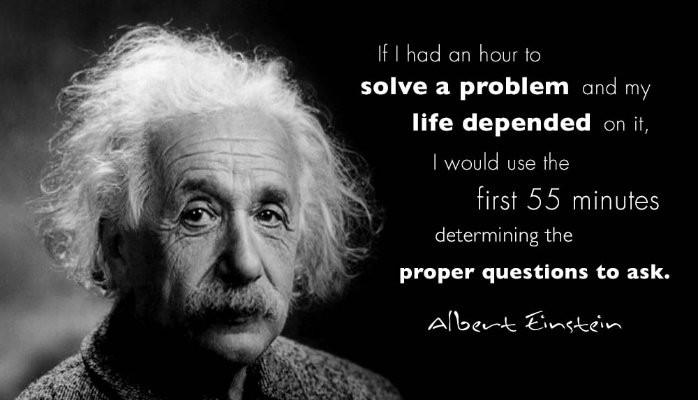Why Ask Better Questions?
Asking the right questions is an art that fuels curiosity, uncovers truth, and unlocks the hidden potential of conversations and learning. Discover why honing your questioning skills can lead to significant improvements in every aspect of your life.

Credit: www.groupsixty.com
The Power of Questions
Questions are powerful tools that drive human interaction, shape our learning, and dictate the quality of our lives. The ability to ask better questions can result in effective communication, enhanced problem-solving skills, and profound personal growth. Let’s delve into the compelling reasons why we should all strive to master the art of questioning.
Reasons to Ask Better Questions
1. Improved Communication Skill
Asking insightful questions facilitates deeper understanding and connection in our conversations. It shows active listening and genuine interest in the people we are communicating with, which can strengthen our relationships both personally and professionally.
2. Enhanced Problem-solving Abilities
Great questions lead to great answers. By framing questions effectively, we can address the root causes of problems, consider diverse perspectives, and arrive at innovative solutions. The process of asking and refining questions can thus be seen as the backbone of critical thinking and creativity.
3. Effective Learning And Curiosity
Asking questions is foundational to learning. When we question, we actively engage with the material, drive our curiosity, and are more likely to remember and understand complex concepts. This leads to a more self-directed and meaningful educational experience.
Using a bulleted list for brief points
- Facilitates active learning over passive reception of information
- Encourages exploration and independent thinking
- Helps to build knowledge in a more structured and comprehensive way
4. Personal Growth
Self-reflection is a critical aspect of personal development. By asking ourselves better questions, we can gain insights into our behavior, goals, and the changes we might want to make. Good questions can trigger self-awareness and lead to transformative life decisions.
5. Building Stronger Networks
When we ask others thoughtful questions, we demonstrate that we value their thoughts and experiences. This can foster a sense of respect and trust, which are essential ingredients in building strong and supportive networks.
Using a table to present the benefits of asking questions
| Benefit | Description |
|---|---|
| Enhances Communication | Deepens understanding and connections in conversations |
| Improves Problem-Solving | Addresses root causes and fosters innovative thinking |
| Boosts Learning | Encourages engagement and memorability of information |
| Promotes Personal Growth | Aids in self-reflection and transformative decisions |
| Strengthens Networks | Builds trust and respect within professional and personal networks |
How to ask better questions?
Asking better questions is a valuable skill that can enhance communication, deepen understanding, and foster meaningful conversations. Here are some tips to help you ask better questions:
Be Clear About Your Goal:
Before asking a question, clarify your goal. Are you seeking information, understanding, opinions, or solutions? Knowing your objective will guide the type of questions you ask.
Open-Ended Questions:
Use open-ended questions to encourage more extended and detailed responses. These questions typically start with words like “how,” “what,” “why,” or “tell me about.”
Avoid Leading Questions:
Be mindful of how you phrase questions to avoid leading the respondent toward a specific answer. Keep questions neutral to promote unbiased and honest responses.
Ask One Question at a Time:
Asking multiple questions in one go can be confusing. Keep it simple and focused by asking one question at a time to ensure clear and precise answers.
Listen Actively:
Pay close attention to the responses you receive. Active listening allows you to follow up with relevant and probing questions, demonstrating genuine interest in the conversation.
Use Reflective Listening:
Reflective listening involves paraphrasing or summarizing what someone has said before asking your next question. This not only shows understanding but also provides an opportunity for clarification.
Consider the Context:
Tailor your questions to the context of the conversation. Consider the setting, the relationship with the person, and the nature of the topic to frame questions appropriately.
Build Rapport:
Establishing a connection with the person you’re questioning can lead to more open and honest responses. Begin with friendly and non-intrusive questions to build rapport before delving into more profound inquiries.
Be Mindful of Tone and Body Language:
Your tone and body language can influence how your questions are received. Maintain a friendly and non-threatening tone, and use open body language to create a comfortable environment.
Ask for Clarification:
If a response is unclear or ambiguous, don’t hesitate to ask for clarification. This not only ensures you understand the answer but also demonstrates your commitment to the conversation.
Encourage Self-Reflection:
Pose questions that encourage individuals to reflect on their thoughts or experiences. Questions like “How did that make you feel?” or “What did you learn from that experience?” prompt deeper insights.
Be Patient:
Allow the person time to think and respond. Rushing through questions may result in superficial answers. Embrace moments of silence as they give individuals the opportunity to formulate thoughtful responses.
Ask Empathetic Questions:
When appropriate, ask questions that show empathy and understanding. This can strengthen your connection with the person and create a more supportive conversation.
Experiment with Different Question Types:
Mix up your question types. Try using hypothetical questions, reflective questions, or probing questions to elicit different aspects of the conversation.
Practice Curiosity:
Approach conversations with a genuine curiosity about the other person’s thoughts and experiences. Cultivating a curious mindset will naturally lead to better questions.
Remember that asking better questions is an ongoing process that improves with practice. By incorporating these tips into your communication style, you can enhance your ability to ask thoughtful, relevant, and insightful questions in various situations.
Frequently Asked Questions
What Are The Benefits Of Asking Questions?
Asking questions fosters learning, encourages critical thinking, and aids in problem-solving by garnering more information and perspectives.
How Do Better Questions Enhance Communication?
Better questions lead to clearer understanding and engagement, facilitating deeper discussions and stronger connections with others.
Can Asking Questions Boost Creativity?
Yes, inquiring with well-thought-out questions stimulates creative thinking and sparks innovative ideas.
Why Is Question Quality Important In Interviews?
Quality questions in interviews reveal insights, gauge candidate competency, and help in making informed hiring decisions.


